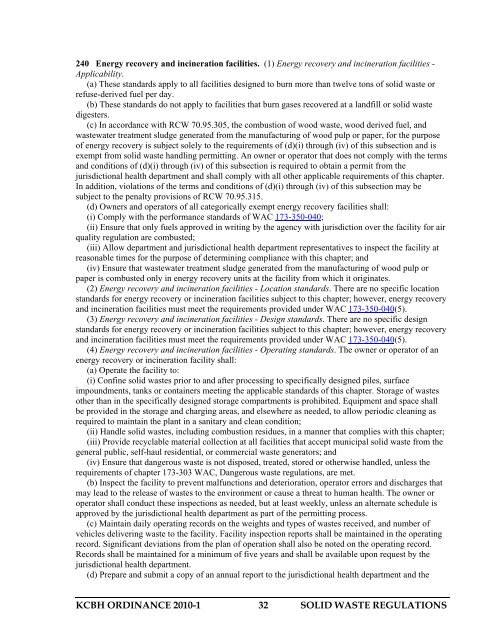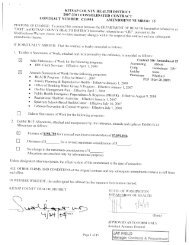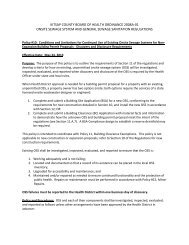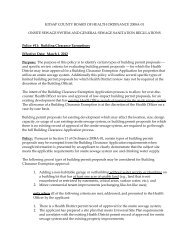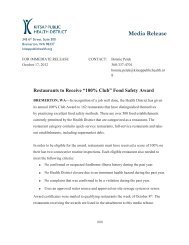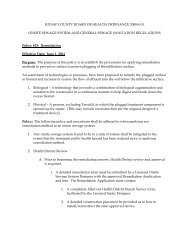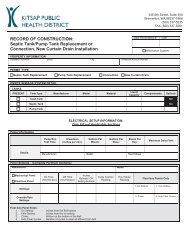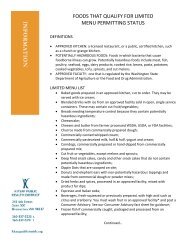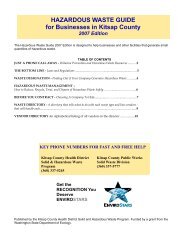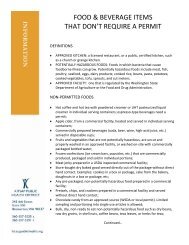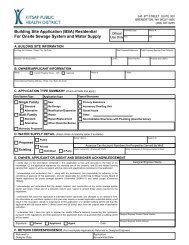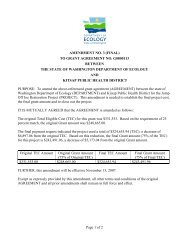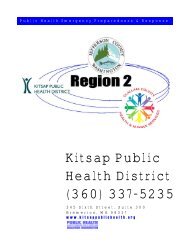SOLID WASTE REGULATIONS - Kitsap Public Health District
SOLID WASTE REGULATIONS - Kitsap Public Health District
SOLID WASTE REGULATIONS - Kitsap Public Health District
Create successful ePaper yourself
Turn your PDF publications into a flip-book with our unique Google optimized e-Paper software.
240 Energy recovery and incineration facilities. (1) Energy recovery and incineration facilities -<br />
Applicability.<br />
(a) These standards apply to all facilities designed to burn more than twelve tons of solid waste or<br />
refuse-derived fuel per day.<br />
(b) These standards do not apply to facilities that burn gases recovered at a landfill or solid waste<br />
digesters.<br />
(c) In accordance with RCW 70.95.305, the combustion of wood waste, wood derived fuel, and<br />
wastewater treatment sludge generated from the manufacturing of wood pulp or paper, for the purpose<br />
of energy recovery is subject solely to the requirements of (d)(i) through (iv) of this subsection and is<br />
exempt from solid waste handling permitting. An owner or operator that does not comply with the terms<br />
and conditions of (d)(i) through (iv) of this subsection is required to obtain a permit from the<br />
jurisdictional health department and shall comply with all other applicable requirements of this chapter.<br />
In addition, violations of the terms and conditions of (d)(i) through (iv) of this subsection may be<br />
subject to the penalty provisions of RCW 70.95.315.<br />
(d) Owners and operators of all categorically exempt energy recovery facilities shall:<br />
(i) Comply with the performance standards of WAC 173-350-040;<br />
(ii) Ensure that only fuels approved in writing by the agency with jurisdiction over the facility for air<br />
quality regulation are combusted;<br />
(iii) Allow department and jurisdictional health department representatives to inspect the facility at<br />
reasonable times for the purpose of determining compliance with this chapter; and<br />
(iv) Ensure that wastewater treatment sludge generated from the manufacturing of wood pulp or<br />
paper is combusted only in energy recovery units at the facility from which it originates.<br />
(2) Energy recovery and incineration facilities - Location standards. There are no specific location<br />
standards for energy recovery or incineration facilities subject to this chapter; however, energy recovery<br />
and incineration facilities must meet the requirements provided under WAC 173-350-040(5).<br />
(3) Energy recovery and incineration facilities - Design standards. There are no specific design<br />
standards for energy recovery or incineration facilities subject to this chapter; however, energy recovery<br />
and incineration facilities must meet the requirements provided under WAC 173-350-040(5).<br />
(4) Energy recovery and incineration facilities - Operating standards. The owner or operator of an<br />
energy recovery or incineration facility shall:<br />
(a) Operate the facility to:<br />
(i) Confine solid wastes prior to and after processing to specifically designed piles, surface<br />
impoundments, tanks or containers meeting the applicable standards of this chapter. Storage of wastes<br />
other than in the specifically designed storage compartments is prohibited. Equipment and space shall<br />
be provided in the storage and charging areas, and elsewhere as needed, to allow periodic cleaning as<br />
required to maintain the plant in a sanitary and clean condition;<br />
(ii) Handle solid wastes, including combustion residues, in a manner that complies with this chapter;<br />
(iii) Provide recyclable material collection at all facilities that accept municipal solid waste from the<br />
general public, self-haul residential, or commercial waste generators; and<br />
(iv) Ensure that dangerous waste is not disposed, treated, stored or otherwise handled, unless the<br />
requirements of chapter 173-303 WAC, Dangerous waste regulations, are met.<br />
(b) Inspect the facility to prevent malfunctions and deterioration, operator errors and discharges that<br />
may lead to the release of wastes to the environment or cause a threat to human health. The owner or<br />
operator shall conduct these inspections as needed, but at least weekly, unless an alternate schedule is<br />
approved by the jurisdictional health department as part of the permitting process.<br />
(c) Maintain daily operating records on the weights and types of wastes received, and number of<br />
vehicles delivering waste to the facility. Facility inspection reports shall be maintained in the operating<br />
record. Significant deviations from the plan of operation shall also be noted on the operating record.<br />
Records shall be maintained for a minimum of five years and shall be available upon request by the<br />
jurisdictional health department.<br />
(d) Prepare and submit a copy of an annual report to the jurisdictional health department and the<br />
KCBH ORDINANCE 2010-1 32 <strong>SOLID</strong> <strong>WASTE</strong> <strong>REGULATIONS</strong>


